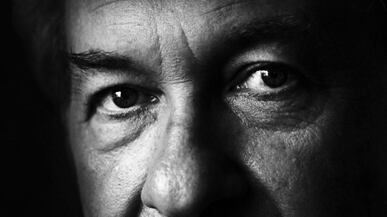Anyone who believes that human beings only use 5 percent of their brains at any given time has never sat down for a chin-wag with Simon Schama, the ebullient, tireless author, art historian, and public intellectual, whose 15th book—a collection of the journalism and essays he’s written in stray minutes, Scribble, Scribble, Scribble, came out last week. (The title comes from a bemused put-down the Duke of Gloucester made to the historian Edward Gibbon, author of The Decline and Fall of the Roman Empire: “Another damned, thick, square book! Always scribble, scribble, scribble! Eh! Mr. Gibbon?”)
On Wednesday morning, the first day of his book tour, Professor Schama met with me in the offices of WNYC, before and after his appearance on NPR’s On Point, during which he declared the “absolute” need for President Obama to revive a constitutional debate on “first principles,” as when James Madison and Alexander Hamilton duked out the exact meaning of the Constitution’s preamble, more than two centuries ago. “How do you interpret ‘the general welfare?’ That’s the kind of debate we ought to be having right now!” Schama said. Conversation on this and a broad array of topics effused from him like a flawlessly rendered, beautifully complex Liszt etude, until, too soon, he was dragged off to appear on The Leonard Lopate Show. Earlier that morning, he’d addressed the Carnegie Council for an hour (“on the abuse of history, and fake history and Glenn Beck, and the Tea Party, and why we should be paying attention”) and edited proofs of a piece he’d written for the Financial Times on the Israeli opposition leader, Tzipi Livni, from the back seat of his car, via red-cased iPhone. After Lopate, Schama would go to CNN for an interview with Eliot Spitzer, and he would wind down the day with a reading at 192 Books, in Chelsea.
Thankfully, however, his words can be corralled after the fact, and brought to stand still on a page, where they can be admired at leisure. In our conversation, we spoke of many of the subjects that come up in the four dozen chapters of Scribble, Scribble, Scribble—disquisitions on England, America, art, oratory, family, travel, Churchill, Isaiah Berlin, politics, film, and food—quite enough to talk about, you would think…and yet, somehow, new topics and tangents continually reared up.
For instance, in the book, Schama writes that he always begins each new writing project with a fountain pen, not a computer. Really? I asked him. “Always?” “Yes,” he said, pulling out a Parker 51 and a Moleskine notebook, and drawing squiggles on the page to illustrate. “Somehow the words don’t have any vitality, any life to them unless I can feel it marking on a paper. That’s how I start. Once I’m off, then I switch to the laptop. I think it would all just be prose if it started on a laptop—not that what I do is poetry.”
He said he likes Parker 51s for their heft, unlike the “too light” Pelikan pens, though he admires the “fantastic antique pen shop” in London called Penfriend, which has Swans and Blackbirds and an aviary of other covetable vintage models. But the Parkers are the pens his father used, and one senses that this is the real reason he favors them. “My dad was so flamboyant, immensely flamboyant,” he continued. His mother was a “hell-raiser” too, as a little girl, though in the book, she’s remembered more for her uninspired cooking, an aspersion that makes Schama wince guiltily. “I do feel slightly full of remorse,” he said. “She was a remarkable, tough, exuberant woman." When Schama was a “little Jewish boy,” growing up in London’s Golders Green in the 1950s, his mother would sing show tunes at breakfast, “she would be Ethel Merman, my father would be Jack Buchanan—he was a kind of hoofer, elegant, music-hall singer.” Arthur Schama worked in textiles—“the family schmatte business,” but was an impresario and producer of amateur theatricals for charity. “He did a killer 'Oklahoma!' and a damn good Macbeth.” Schama said. “Every Saturday morning before going to synagogue, I got the biggest treat. My dad had this running story about a 10-year-old boy called 'Knock-‘em-down Ginger,' and I’d climb into bed, and there’d be a new episode—‘Knock-‘em-down Ginger gets into trouble again.’ Then we’d march off to synagogue.” Then they’d head back home, for his mother’s cholent. “ Taam gan eden,’ she would murmur dreamily—‘The Taste of the Garden of Eden,’” he writes. But their son had a more global appetite.
Of his uncompleted novel, he says, “I know the characters, and I know the plot. I know all that about the people in this book.”

Schama avoided the schmatte business, studying at Cambridge, then teaching at Oxford (he began his academic career as a scholar of the French Revolution); but when he wanted to throw his scholarly lasso wider, to haul in 17th-century Holland, among other things, the dons balked. “I remember suggesting I teach a course on Dutch art at Oxford and everyone thought, ‘Why the hell would you want to do that?’ That wasn’t the way Oxford life was." And so, in 1980, Schama took a job in the United States, at Harvard. He’d been to America before, visiting New York in the '60s, which reminded him of home. “Golders Green kind of had the raucousness of New York,” he reminisced as he sipped a coffee. “The raw-knuckle vulgarity. I was up for everything America could deliver. I felt New York was a big, more stylish, more metropolitan Golders Green. I was thrilled.”
But in 1979, Schama had crossed the pond for what his friend Norman Stone, the British historian, calls “a doggy-bottom-sniffing operation—he’s a Glaswegian—” Schama added, by way of explanation. “You know, when you go to an interview, and you’re not sure you’re going to get the job. In Harvard in 1979, someone said a sentence I thought I’d never hear in my professorial life: What would you like to teach? I said, how about a course on 18th-century politics and art in France and England, the two feed into each other—Hogarth and David.” They agreed. “It was exactly where my passions were,” he said. “I thought, if you’re going to spend your life as a professor, why not teach your enthusiasms? America let me do that.”
Not only did he like the American academia, he liked the “open-minded ingenuousness” of students. “The kids are very smart, they’re very up for knowledge,” he said. Back in England he explained, “very well educated British kids came to their tutorials with this amused attitude, as if they knew everything already. I always am put in mind of what Cousin Jasper says in Brideshead Revisited—‘Treat the don like the village parson, and you won’t go far wrong’—and I thought, fuck it. This sense of entertaining condescension got to me.” The danger for a professor in this country, he added, “is narcissism. You teach what you like, so it’s interesting to you, and back comes an exam that sounds exactly like you, and you think, ‘What a brilliant student, I’d better give him an “A”’—there’s a danger of getting off on your own professorial personality.”
Though he’s never become a U.S. citizen (“Ideally, I’d like to have two passports”), Schama has lived in America ever since, teaching at Harvard, and now, at Columbia, where his wife, Ginny Papaioannou, is a developmental geneticist. They have two grown children, Chloe, who is an editor at The New Republic, and author of a book about a dashing woman involved in a Victorian bigamy trial; and Gabriel, who lives in San Francisco, and designs chairs. Gabriel is vegetarian—though a touching section in the book recalls Gabriel’s love for his father’s meatloaf, or “polpettone.” He writes that Gabriel, “wrote his college application essay about father-son bonding in the hunt for the perfect meatloaf recipe.”
Schama has no intention of converting his son back to meat-eating—“he’s a very creative vegetarian cook, and a great baker,” he says proudly, showing a picture of Gabriel that his daughter Chloe had sent him on his iPhone. He and his family members follow separate pursuits, in American tradition. (Though Gabriel is currently designing a spiral staircase whose steps hold bookshelves, a marvelous metaphorical intertwining of the passions of his literary father and scientist mother). Besides, he’s fully occupied with his teaching, his journalistic moonlighting (for GQ, Vogue, the Financial Times, The New Yorker, and any other place where voice is appreciated), and, inevitably his next book—which is also a television project.

“It’s on Jewish history, the story of the Jews,” he says, his eyes twinkling, because he knows the subject sounds insuperably vast. Of course, he has found a personal angle that makes it all the more particular, and more lively. “It’s really about Jews among the goyim, it’s really about—I hate the word ‘interface,’ but, the engagement of Jews with the society around them.” His theme is acculturation, as opposed to assimilation. “The starting point is that there’s an entire community of Jewish mercenary soldiers in fifth century BC, in Egypt. We know about them because their world was preserved in papyri, which were first found in the first decade of 20th century.” He continues, “What is incredibly eye-opening is the extent to which those Jews are deeply immersed in the society that surrounds them. And there’s another strand to the book: the materials, literally, papyrus, mosaics—it’s not true the Jews have never been into figurative art!”
Art, history, politics, food, music (he’s written about Leonard Cohen, though it’s not in this book, “there wasn’t room”)—is there anything this dazzling polymath cannot turn into language? “Dance, I don’t really know about it,” he concedes. And he’s yet to write a straightforward novel. (A playful book he wrote that fictionalizes history, called Dead Certainties, was so hard to classify that editors from The New York Times Book Review called him when it was under review to ask whether it was non-fiction or fiction.) Of his uncompleted novel, he says, “I know the characters, and I know the plot. I’ve taken a leaf out of Turgenev’s book, because Turgenev apparently used to fill notebooks with detailed descriptions of his characters, what their favorite food was, what they read, what material they liked to wear next to their skin. I know all that about the people in this book.” But, he adds, “I won’t take a contract—hello, publishers out there!—because what if it turns out it’s crap and I can’t write fiction?” All this, and humble, too?
But our time is up, the door of the green room opens, and away Schama must go, borne off on the wave of his charm and erudition, to continue spreading his story of anthropology, history, art, politics, and personality to anyone who can keep up with his voracious curiosity.
Plus: Check out Book Beast, for more news on hot titles and authors and excerpts from the latest books.
Liesl Schillinger is a New York-based writer and literary critic whose work has appeared in The New York Times, The New Yorker, New York magazine, The Washington Post, the New Republic, The London Independent on Sunday, and other publications here and abroad.





